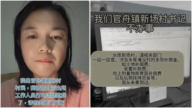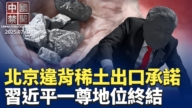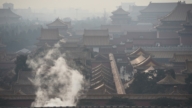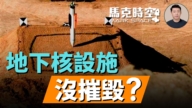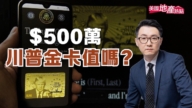【新唐人2014年08月25日讯】在大陆无官不贪的大环境之下,身为当局钱袋子之一的“国有企业”贪腐更为严重,频频爆出各种丑闻。日前,中共国家主席习近平发话,要对国企高管的过高收入进行调整。外界分析,国企很有可能成为习近平反腐的下一波重点对像。也有评论认为,习近平在拿下大批江派高官之后,开始回过头来试图解决中国经济难题。
22号,大陆《南方都市报》报导,广州市“白云农工商联合公司”原总经理张新华,涉嫌贪污受贿高达近4亿元,虽然他只是处级官员,却创下了广州办案机关披露的贪腐金额记录。
此前不久,上海光明集团原董事长王宗南因涉嫌挪用公款、受贿,被逮捕。而自今年以来,已有华润集团原董事长宋林、中国出版集团原副总裁王俊国等,超过40名国企高管被查处。
但这只是国企贪腐的冰山一角。实际上,中国大陆几乎每一家国企都贪腐成风。除了在审批、招标等环节上大肆贪污、受贿之外,各国企高管更是以所谓“职务消费”为名,上演“不落腰包的腐败”,堂而皇之的坐豪车、住豪华酒店、进出高档休闲会所。
大陆252家国有A股上市公司年报数据显示,仅2012年一年,这些企业公开的招待费就达65亿元。而2009年被判死缓的中石化原董事长陈同海,更曾爆出每天“职务消费”高达4万元。
这个月18号,中共国家主席习近平在“中央全面深化改革领导小组”第四次会议上表示,要规范国有企业收入分配秩序,对不合理的偏高、过高收入进行调整。他强调,将严格规范中央企业负责人履职待遇、业务支出,除了国家规定以外,国企负责人没有其他的“职务消费”。
《新唐人》特约经济评论专家杰森:“国营企业老总很多时候都是官二代,或者说是有背景的,红三代之类的。历史上对于国营企业老总的工资怎么做这样的事情,甚至连提都不敢提,只是有争议。”
《新唐人》特约经济评论专家杰森表示,国企本身就是中共一党专制下的怪胎,而国企老总则是怪胎的衍生物。他们作为中共官员,根本不懂经营,但因为有当局的政策支持、国企的垄断地位,而保证国企只赚不赔,所以这些国企高管养尊处优,形成了利益集团。
杰森分析,对于习近平来说,他前一段时间拿下了江泽民派系的一些高官,为自己立了威,所以现在敢于把国企老总的工资往下拉。
杰森:“他很可能一方面稳固前一段时间政治斗争中的一些抵抗力量,同时的话,他可能会回过手来,解决中国经济上的一些问题。但中国的经济问题是错综复杂的,很难一时解决清楚,解决不了的话,唯一能做的就是平一点民愤。”
大陆经济学家杨斌也表示,当局一方面尝试缩减国企老板的钱袋子,一方面又不想进行根本制度上的变革,一直在不断给予国企各种政策扶持和优惠,声称要“加强国企活力”。
大陆经济学家杨斌:“而国企恰恰是没有活力的东西、很僵化的东西,你非得增加它的活力。而民企是很活跃的东西,你不给它输血。这就是本末倒置了。所以说,最主要问题是这个。”
香港《南华早报》最近报导称,大陆主要国企,尤其是金融领域部分高管将面临减薪一半。大陆媒体报导说,目前上海、北京、广东等多地已出台方案,将严格规范国企高管薪资。
采访/陈汉 编辑/李谦 后制/李智远
Xi Jinping Moves Anti-corruption Campaign To State-owned Enterprises
Corruption has become ubiquitous among the Chinese
Communist Party (CCP) officials.
As a major fund source of the CCP, corruption in state-owned
enterprises is especially serious where scandals
had been continuously exposed recently.
Not long ago, the CCP president Xi Jinping said changes
will be made on excessively high incomes of executives
of state-owned enterprise.
Commentators thus speculate state-owned companies
will be the next target of Xi’s anti-corruption campaign.
Some also say that after a massive take down
of Jiang Zemin’s followers, Xi is now turning back to solve
the difficulties in China’s economy.
On Aug. 22, Southern Metropolis Daily reported that
Zhang Xinhua, former general manager of the Baiyun Farm
Industry and Commerce Enterprise,
was suspected of embezzling 400 million yuan ($65 million).
Although Zhang is only a divisional-level official,
he sets the record of involving the biggest amount of money
among Guangzhou’s corruption cases.
Not long before, former chairman of Shanghai Bright Food
Group Wang Zongnan was arrested on embezzlement
and bribery charges.
Since 2014, over 40 senior officials of state-owned
enterprises had been investigated, including former
chairman of Huarun Group Song Lin and vice president
of the China Publishing Group Wang Junguo.
However, those are only the tip of the iceberg.
The truth is, almost every CCP state-owned company
has serious corruption problems in biding and approving
procedures of projects.
Senior officials also use public funds for their own
enjoyment without direct embezzlement.
In the name of “business expenditure,” they openly enjoy
luxury cars, luxury hotels and top-grade clubhouses.
Annual reports show that 252 state-owned listed companies
of A-shares had spent 6.5 billion Yuan ($1.1 billion)
as entertainment costs only in the year of 2012.
Chen Tonghai, the ex-boss of Sinopec who was sentenced
to death with reprieve in 2009, reportedly spent
40,000 Yuan ($6,500) per day as “business expenditures.”
On Aug. 18, Xi Jinping gave a talk in the fourth meeting
of the Central Leading Group for Comprehensively
Deepening Reforms.
Xi said, state-owned enterprises need to regulate their
income distribution and trim off excessively high incomes.
Xi stressed that strict regulations will be applied to leaders
of state-owned companies, as well as their incomes
and business expenditures.
No “business expenditures” will be allowed except
those subject to state rules.
Jason Ma, economic commentator of NTDTV: “Many
state-owned enterprise leaders are children of CCP officials
or with special background.
In the CCP’s history, no one ever had the courage to talk
about regulating their incomes.
There were only discussions in private talks.”
Jason Ma said state-owned companies are intrinsically
oddballs born from the CCP’s single-party dictatorship.
The leaders of these “oddballs” are simply party officials
and know nothing about management.
However, state-owned companies are monopolies
protected by the CCP’s policies, and thus never take
any risks or losses.
In such a situation, their leaders form interest groups
that always enjoy luxury and privilege.
Jason Ma commented that Xi Jinping established his
authority by striking down a group of high officials from
Jiang Zemin’s group;
Therefore now he has the courage to call a salary cut
of those state-owned enterprise leaders.
Jason Ma: “Probably on one hand, Xi is stabilizing powers
that resisted him in the struggle not long ago.
On the other hand, he may be turning back to solve
some economic problems.
However, China’s economic problems are very complicated.
It is difficult to solve them all at once.
All he can do is only to ease public anger by a little bit.”
Chinese economist Yang Bin said despite pay cuts
on state-owned company bosses, the CCP still refuses
to make any fundamental reforms on its system.
It keeps giving support to state-owned ones with favorable
policies, claiming to be “energizing them.”
Yang Bin, Chinese economist: “State-owned companies
are exactly the ones with no energy.
They are very inflexible.
But the CCP tries to energize them instead of private ones,
which were born with real energy.
This puts the cart before the horse and that is where
the real problem is at.”
Hong Kong-based South China Morning Post recently
reported that senior officials of the CCP’s major
state-owned companies, particularly those in financial field,
will face a 50 percent salary cut.
Chinese media also said, Shanghai, Beijing, Guangdong
and other places introduced plans of strictly regulating
income of state-owned company leaders.
Interview/ChenHan Edit/LiQian Post-Production/Li Zhiyuan








